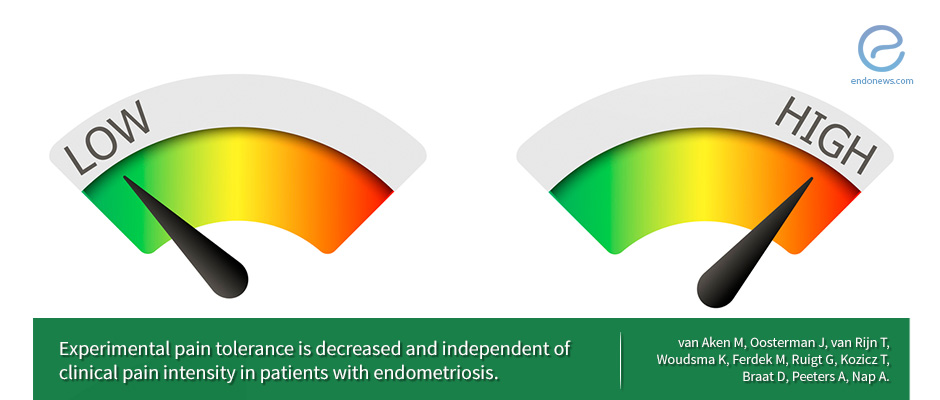Pain Education or Cognitive Therapy Could Help Women with Endometriosis
Jan 24, 2019
Endometriosis treatment should not solely focus on surgery or medication.
Key Points
Highlights:
- Women with endometriosis have a reduced pain tolerance regardless of pain intensity and disease stage.
Importance:
- Chronic pain can modify the structure and function of the brain, and potentially result in alterations in the way it processes. There are ways to reduce pain sensitization.
- Better understanding the mechanism of pain development can help develop new treatment options for women living with endometriosis.
What's done here:
- Researchers from The Netherlands conducted a cross-sectional study in 35 women with endometriosis and 38 women without the disease.
Key results:
- Women with endometriosis had a significantly decreased pain tolerance compared to healthy controls.
- The decrease in pain tolerance was independent of clinical pain intensity or endometriosis stage.
Limitations:
- All participants were treated with hormonal therapy and used analgesics if necessary. This may have reduced pain symptoms and therefore participants may not represent the whole population of endometriosis patients.
- The sample size was relatively small and included only 35 patients with endometriosis and 38 without.
Lay Summary
Women with endometriosis have a significantly lower pain tolerance regardless of the intensity of the pain they experience or the severity of their disease, according to a study published in the scientific journal Fertility and Sterility.
Although pain is the most common symptom of endometriosis, it is not fully understood how it exactly develops; since the severity of the disease does not seem to correlate with the intensity of the pain which patients experience. Some researchers think that pain associated with endometriosis could be the result of the development of new blood vessels and nerve fibers in and around the endometriotic lesions, while others propose that the pain could be caused by tissue damage and certain substances produced by these lesions.
It is known that chronic pain can modify the structure and function of the brain and potentially result in alterations in the way it processes pain. For example, chronic pain can lead to a phenomenon known as central sensitization where the pain experienced is amplified with time even though the cause of the pain remains unchanged.
There are ways to reduce sensitization pain including pain education and cognitive therapy.
The authors of the present study stress the importance of these approaches to reducing pain experienced by women with endometriosis instead of only treating the disease “in a surgical or pharmacologic way”. “Increasing knowledge concerning mechanisms underlying the pain of women with endometriosis creates opportunities to develop new treatment options," they write. In order to better understand pain mechanisms and investigate how pain tolerance thresholds are altered in women with endometriosis, the team conducted a cross-sectional study in 35 women with proven endometriosis and 38 healthy controls. They assessed the women’s pain processing using a test called quantitative sensory testing (QST) to investigate sensation, pain, and pain tolerance thresholds for heat, electrical stimulation, and pressure. They took QST measures on the endometriosis site and control sites. They found that women with endometriosis had a significantly decreased pain tolerance compared with healthy controls. This was the case regardless of clinical pain intensity or endometriosis stage. They concluded that there may be alterations in pain processing mechanisms in women with endometriosis compared to healthy controls. “ We regard pain processing and sensitivity as an urgent research area,” they wrote.
They added that treatment options such as transcutaneous electrical nerve stimulation (TENS), exercise therapy, pain education, and cognitive behavioral therapy can be used to target sensitization and improve patients’ quality of life.
Research Source: https://www.ncbi.nlm.nih.gov/pubmed/?term=30396556
pain threshold central sensitization

